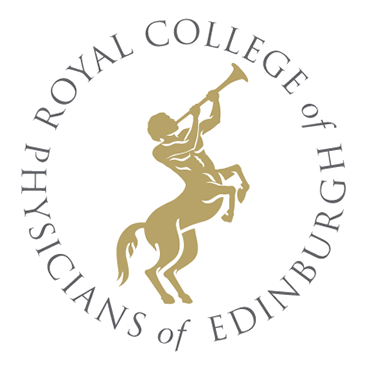
The Consultation Letters of Dr William Cullen (1710-1790) at the Royal College of Physicians of Edinburgh
[ID:4666] From: Dr William Cullen (Professor Cullen) / To: Mr William Ingham / Regarding: Miss Mary Peareth (Pearith, Peariths) (Patient), Miss Ellison (Alison) (Patient), Mr Ralph Bates (Patient) / 29 July 1783 / (Outgoing)
Reply [probably to William Ingham] concerning the case of Miss M[ary] Peariths, who is to take Lixivium for her gravel, a specimen of which has been sent to Cullen {Vol. 16, pp.154-5]. Main body in hand of anamanuensis, recipe inserted in Cullen's hand.
- Facsimile
- Normalized Text
- Diplomatic Text
- Metadata
- Case
- People
- Places
Facsimile
There are 4 images for this document.
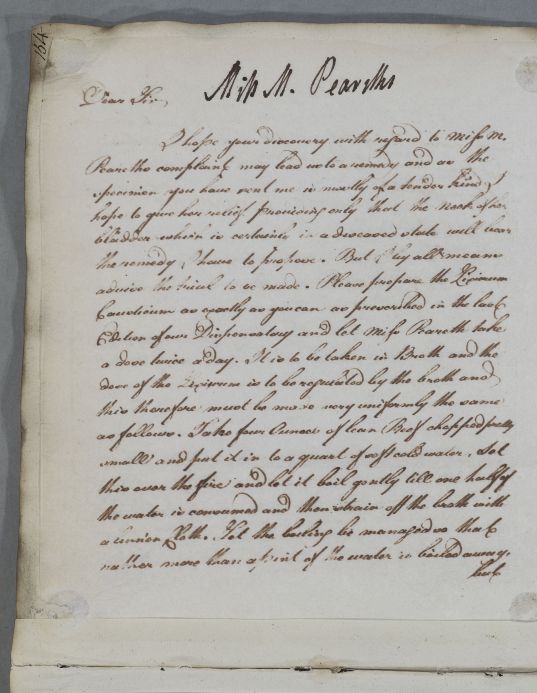
[Page 1]
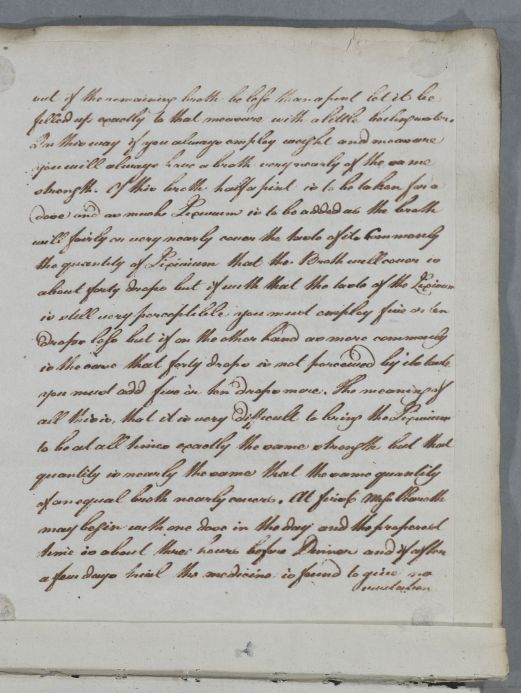
[Page 2]
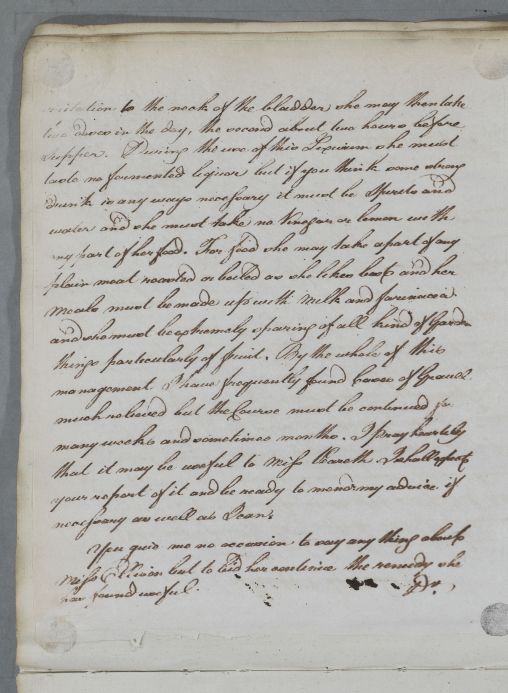
[Page 3]
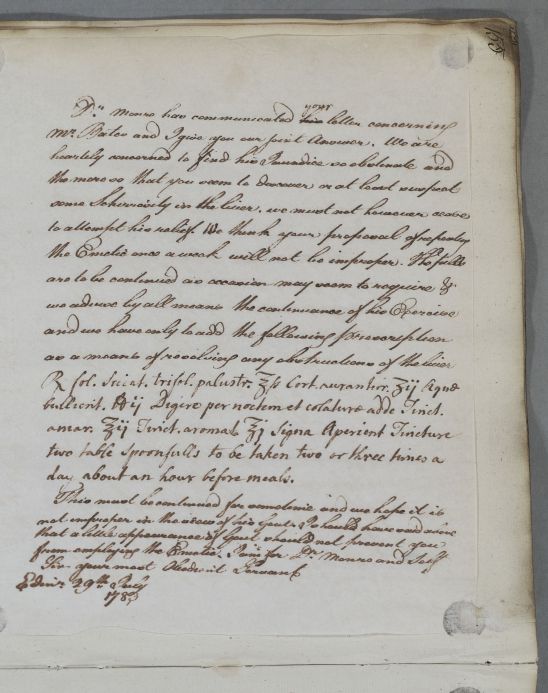
[Page 4]
Metadata
| Field | Data |
|---|---|
| DOC ID | 4666 |
| RCPE Catalogue Number | CUL/1/1/16/70 |
| Main Language | English |
| Document Direction | Outgoing |
| Date | 29 July 1783 |
| Annotation | None |
| Type | Machine scribal copy |
| Enclosure(s) | No enclosure(s) |
| Autopsy | No |
| Recipe | Yes |
| Regimen | No |
| Letter of Introduction | No |
| Case Note | No |
| Summary | Reply [probably to William Ingham] concerning the case of Miss M[ary] Peariths, who is to take Lixivium for her gravel, a specimen of which has been sent to Cullen {Vol. 16, pp.154-5]. Main body in hand of anamanuensis, recipe inserted in Cullen's hand. |
| Manuscript Incomplete? | No |
| Evidence of Commercial Posting | No |
Case
Cases that this document belongs to:
| Case ID | Description | Num Docs |
|---|---|---|
| [Case ID:52] |
Case of Miss Mary Peareth who has a painful bladder condition. |
25 |
| [Case ID:747] |
Case of Mr Ralph Bates who has rheumatic pains and a liver and bowel complaint which proves fatal. |
11 |
| [Case ID:1572] |
Case of Miss Ellison who suffers from a number of conditions including costiveness, a nervous complaint in her head and an inflamed eye. |
12 |
People linked to this document
| Person ID | Role in document | Person |
|---|---|---|
| [PERS ID:1] | Author | Dr William Cullen (Professor Cullen) |
| [PERS ID:82] | Addressee | Mr William Ingham |
| [PERS ID:2597] | Patient | Miss Ellison (Alison) |
| [PERS ID:2598] | Patient | Mr Ralph Bates |
| [PERS ID:80] | Patient | Miss Mary Peareth (Pearith, Peariths) |
| [PERS ID:89] | Patient's Physician / Surgeon / Apothecary | Professor Alexander Monro (secundus; Munro ) |
| [PERS ID:1] | Patient's Physician / Surgeon / Apothecary | Dr William Cullen (Professor Cullen) |
| [PERS ID:82] | Patient's Physician / Surgeon / Apothecary | Mr William Ingham |
Places linked to this document
| Role in document | Specific Place | Settlements / Areas | Region | Country | Global Region | Confidence |
|---|---|---|---|---|---|---|
| Place of Writing | Cullen's House / Mint Close | Edinburgh | Edinburgh and East | Scotland | Europe | certain |
| Destination of Letter | Newcastle upon Tyne | North-East | England | Europe | inferred |
Normalized Text
Miss M. Peariths
Dear Sir,
I hope your discovery with regard to Miss M.
Peariths complaint may lead us to a remedy and as the
specimen 1 you have sent me is mostly of a tender kind I
hope to give her relief providing only that the Neck of her
bladder which is certainly in a diseased state will bear
the remedy I have to propose. But I by all means
advise the trial to be made. Please prepare the Lixivium
Causticum as exactly as you can as prescribed in the last
Edition of our Dispensatory 2 and let Miss Peareth take
a dose twice a day. It is to taken in Broth and the
dose of the Lixivium is to be regulated by the broth and
this therefore must be made very uniformly the same
as follows. Take four Ounces of lean beef chopped pretty
small and put it in to a quart of soft cold water, Set
this over the fire and let it boil gently till one half of
the water is consumed and then strain off the broth with
a linnen Cloth. Let the boiling be managed so that
rather more than a pint of the water is boiled away
[Page 2]
but if the remaining broth be less than a pint let it be
filled up exactly to that measure with a little barley water.
In this way if you always employ weight and measure
you will always have a broth very nearly of the same
strength. Of this broth half a pint is to be taken for a
dose and as much Lixivium is to be added as the broth
will fairly as very nearly cover the taste of it. Commonly
the quantity of Lixivium that the Broth will cover is
about fourty drops but if with that the taste of the Lixivium
is still very perceptible you must employ five or ten
drops less but if on the other hand as more commonly
is the case that forty drops is not perceived by its taste
you must add five or ten drops more. The meaning of
all this is, that it is very difficult to bring the Lixivium
to be at all times exactly the same strength but that
quantity is nearly the same that the same quantity
of an equal broth nearly cover. At first Miss Pearith
may begin with one dose in the day and the properest
time is about three hours before Dinner and if after
a few days trial the medicine is found to give no
[Page 3]
irritation to the neck of the bladder she may then take
two doses in the day, the second about two hours before
Supper. During the use of this Lixivium she must
taste no fermented liquor but if you think some strong
drink is any ways necessary it must be Spirits and
water and she must take no Vinegar or lemon with
any part of her food. For food she may take a part of any
plain meat roasted or boiled as she likes best and her
Meals must be made up with milk and farinacea
and she must be extremely sparing of all kind of Garden
things particularly of fruit. By the whole of this
management I have frequently found Cases of Gravel
much relieved but the Course must be continued for
many weeks and sometimes months. I pray heartely
that it may be useful to Miss Pareth I shall expect
your report of it and be ready to mend my advice if
necessary as well as I can.
You give me no occasion to say any thing about
Miss Ellison but to bid her continue the remedy she
has found useful.
[Page 4]
D.r Monro has communicated his (↑your↑) letter concerning
M.r Bates and I give you our fixt Answer. We are
heartily concerned to find his Jaundice so obstinate and
the more so that you seem to discover or at least suspect
some Schirrosity in the liver, we must not however cease
to attempt his relief. We think your proposal of repeating
the Emetic once a week will not be improper. The pills
are to be continued as occasion may seem to require &
we advise by all means the continuance of his Exercise
and we have only to add the following prescription
as a means of resolving any obstruction of the liver 3
Take half an ounce of Dried leaves of trefoil water, two drachms of Orange peel and two pounds of boiling water. Let it digest overnight and add to the strained liquid two ounces of bitter Tincture and one ounce of aromatic Tincture. Label: Aperient Tincture. Two tablespoon to be taken two or three times a day about an hour before meals.
This must be continued for sometime and we hope it is
not improper in the [view?] of his Gout. I should have said above
that a little appearance of Gout should not prevent you
from employing the Emetic. I am for Dr. Monro and Self
Sir your most Obedient Servant
Edinburgh 29th.. July
1783
Notes:
1: This implies that Cullen has been sent a sample of calculi (sand), but no incoming letter traced to confirm this interpretation.
2: See Pharmacopoeia Collegii Regii Medicorum Edinburgensis (Edinburgh: 1774), p. 118 (a new edition appeared sometime in 1783, in which this same formula appears on p. 157).
3: The main body of this letter was written out by Cullen's amanuensis, but the recipe below is an insertion his own hand.
Diplomatic Text
Miss M. Peariths
Dear Sir,
I hope your discovery with regard to Miss M.
Peariths complaint may lead us to a remedy and as the
specimen 1 you have sent me is mostly of a tender kind I
hope to give her relief providing only that the Neck of her
bladder which is certainly in a diseased state will bear
the remedy I have to propose. But I by all means
advise the trial to be made. Please prepare the Lixivium
Causticum as exactly as you can as prescribed in the last
Edition of our Dispensatory 2 and let Miss Peareth take
a dose twice a day. It is to taken in Broth and the
dose of the Lixivium is to be regulated by the broth and
this therefore must be made very uniformly the same
as follows. Take four Ounces of lean beef chopped pretty
small and put it in to a quart of soft cold water, Set
this over the fire and let it boil gently till one half of
the water is consumed and then strain off the broth with
a linnen Cloth. Let the boiling be managed so that
rather more than a pint of the water is boiled away
[Page 2]
but if the remaining broth be less than a pint let it be
filled up exactly to that measure with a little barley water.
In this way if you always employ weight and measure
you will always have a broth very nearly of the same
strength. Of this broth half a pint is to be taken for a
dose and as much Lixivium is to be added as the broth
will fairly as very nearly cover the taste of it. Commonly
the quantity of Lixivium that the Broth will cover is
about fourty drops but if with that the taste of the Lixivium
is still very perceptible you must employ five or ten
drops less but if on the other hand as more commonly
is the case that forty drops is not perceived by its taste
you must add five or ten drops more. The meaning of
all this is, that it is very difficult to bring the Lixivium
to be at all times exactly the same strength but that
quantity is nearly the same that the same quantity
of an equal broth nearly cover. At first Miss Pearith
may begin with one dose in the day and the properest
time is about three hours before Dinner and if after
a few days trial the medicine is found to give no
[Page 3]
irritation to the neck of the bladder she may then take
two doses in the day, the second about two hours before
Supper. During the use of this Lixivium she must
taste no fermented liquor but if you think some strong
drink is any ways necessary it must be Spirits and
water and she must take no Vinegar or lemon with
any part of her food. For food she may take a part of any
plain meat roasted or boiled as she likes best and her
Meals must be made up with milk and farinacea
and she must be extremely sparing of all kind of Garden
things particularly of fruit. By the whole of this
management I have frequently found Cases of Gravel
much relieved but the Course must be continued for
many weeks and sometimes months. I pray heartely
that it may be useful to Miss Pareth I shall expect
your report of it and be ready to mend my advice if
necessary as well as I can.
You give me no occasion to say any thing about
Miss Ellison but to bid her continue the remedy she
has found useful.
[Page 4]
D.r Monro has communicated his (↑your↑) letter concerning
M.r Bates and I give you our fixt Answer. We are
heartily concerned to find his Jaundice so obstinate and
the more so that you seem to discover or at least suspect
some Schirrosity in the liver, we must not however cease
to attempt his relief. We think your proposal of repeating
the Emetic once a week will not be improper. The pills
are to be continued as occasion may seem to require &
we advise by all means the continuance of his Exercise
and we have only to add the following prescription
as a means of resolving any obstruction of the liver 3
℞ fol. Siccat. trifol. palustr. ℥fs Cort. auranti or. ʒij Aqua
bullient. ℔ij Digere per noctem et colaturæ adde Tinct.
amar. ℥ij Tinct. aromat ℥j Signa Aperient Tincture
two table spoonfulls to be taken two or three times a
day about an hour before meals.
This must be continued for sometime and we hope it is
not improper in the [view?] of his Gout. I should have said above
that a little appearance of Gout should not prevent you
from employing the Emetic. I am for Dr. Monro and Self
Sir your most Obedient Servant
Edin.r 29th.. July
1783
Notes:
1: This implies that Cullen has been sent a sample of calculi (sand), but no incoming letter traced to confirm this interpretation.
2: See Pharmacopoeia Collegii Regii Medicorum Edinburgensis (Edinburgh: 1774), p. 118 (a new edition appeared sometime in 1783, in which this same formula appears on p. 157).
3: The main body of this letter was written out by Cullen's amanuensis, but the recipe below is an insertion his own hand.
XML
XML file not yet available.
Feedback
Send us specfic feeback about this document [DOC ID:4666]
Please note that the Cullen Project team have now disbanded but your comments will be logged in our system and we will look at them one day...

